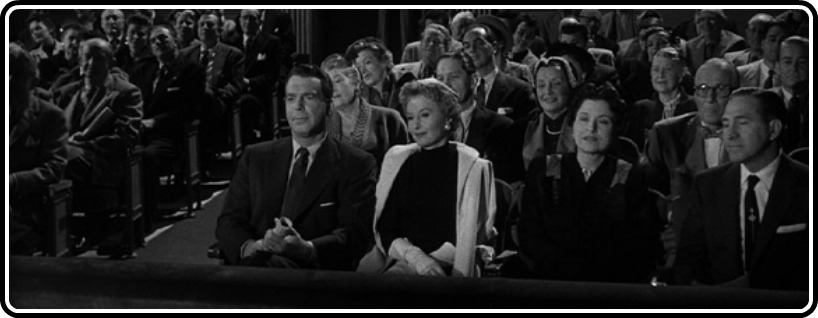There haven’t been too many voices in the film world quite like one Douglas Sirk. Best known as the king of Hollywood melodramas, his beautifully lavish pictures are as heightened emotionally as they could ever imagine being aesthetically, and while melodrama has become a laughed at genre of fiction, Sirk’s films seem to stand as definitive examples of the power of the genre. However, even he as a director hasn’t been as well respected as an auteur of his powers should rightly be.
One unsung picture happens to not only be one of the director’s best black and white features, but also nabs up two breathtaking performances from two of cinema’s most engrossing stars. Entitled There’s Always Tomorrow, the film stars Fred MacMurray as a man named Clifford Groves, a toy company executive who is both a great businessman, and a loving husband and father at home. However, with growing resentment behind his eyes due to a seeming lack of respect and appreciation back home, the introduction a former co-worker back into his life turns that said life upside down. A past love is rekindled and a life turned inside out in this deeply resonant and beautifully acted melodrama that is as entrancing visually as it is engrossing performance-wise.
Leading the way is MacMurray here, in an odd digression for a Sirk leading character. Often times setting his films with a female lead, the gender switch is an intriguing change of pace for those with more than a passing interest in Sirk oeuvre. MacMurray is opposite a fearsome Barbara Stanwyck and while the scenes of them together prove the two as truly one of cinema’s most underrated on screen duos (they did make four films together) they each bring something so beautiful to an already entrancing picture. MacMurray is a perfect every-man type leading actor, so much so that while the central idea the film posits (that of a man wanting to leave his family for this new, seemingly more vibrant, life) is odd and in less assured hands would be seen as a complete negative, Sirk and MacMurray give the character so much care and understanding that it sets up the film’s actual drama to perfection. Stanwyck is equally great here as an aging flame of our lead’s, a working woman who has finally found some respect in the world of fashion. She, like MacMurray’s lead, could be seen as a complete monster for inspiring what could be the ending of this family, but there is a grace and a melancholy to this entire central relationship that seems to stem entirely from behind the eyes of Stanwyck, turning this into a really underrated performance from one of cinema’s great leading ladies. Some supporting turns are a bit off, primarily that of William Reynolds as Clifford’s son Vinnie, but within the film’s narrative each character is not only given a thing to help push it forward, but some really solid characterization as well. Someone like Pat Crowley, taking the role of Vinnie’s beau Ann, is given a sequence or two here, with a scene going to just about every major player here, in what is a really great little ensemble picture.
Aesthetically, the film is a real wonder. With gorgeous black and white photography, the lead character’s employment at a toy factory not only allows the film to mine some intriguing thematic material but also set up some really telling and quite evocative shots here (particularly one involving a robot near the film’s conclusion). Sirk’s frame is loaded with content, be it lavish night gowns or lusciously decorated sets, and yet the director’s ability to play around within this loaded world is truly something magical. Again, the cinematography here is revelatory, and with two great lead performances to boot, this look at middle American malaise is both completely of its own singular era and yet completely and utterly timeless and relatable. A classic, this film truly is.
And as such, it’s more than deserving of a Criterion Collection release. A new restoration could do this film wonders, as it is in far from mint condition, and it is absolutely worthy of a collection of informative supplements. There’s an early version of this story, much like the earlier adaptation of Magnificent Obsession that joins the Criterion release of the Sirk film, and it would be a welcome addition here. Toss in a collection of interviews with cast members that are still alive and even a video essay or two, and you’d have a release that would have to be near the top of many fan’s must have lists.




![Bergman Island (The Criterion Collection) [Blu-ray]](https://criterioncast.com/wp-content/uploads/2022/11/bergman-island-the-criterion-collection-blu-ray-400x496.jpg)
![This Is Not a Burial, It’s a Resurrection (The Criterion Collection) [Blu-ray]](https://criterioncast.com/wp-content/uploads/2022/11/this-is-not-a-burial-its-a-resurrection-the-criterion-collection-blu-ray-400x496.jpg)
![Lars von Trier's Europe Trilogy (The Criterion Collection) [The Element of Crime/Epidemic/Europa] [Blu-ray]](https://criterioncast.com/wp-content/uploads/2022/11/lars-von-triers-europe-trilogy-the-criterion-collection-the-element-of-400x496.jpg)
![Imitation of Life (The Criterion Collection) [Blu-ray]](https://criterioncast.com/wp-content/uploads/2022/11/imitation-of-life-the-criterion-collection-blu-ray-400x496.jpg)
![The Adventures of Baron Munchausen (The Criterion Collection) [4K UHD]](https://criterioncast.com/wp-content/uploads/2022/11/the-adventures-of-baron-munchausen-the-criterion-collection-4k-uhd-400x496.jpg)
![Cooley High [Criterion Collection] [Blu-ray] [1975]](https://criterioncast.com/wp-content/uploads/2022/11/cooley-high-criterion-collection-blu-ray-1975-400x496.jpg)